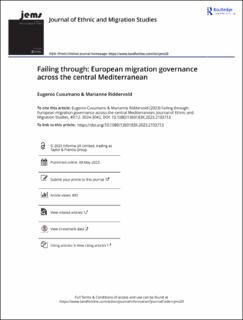| dc.contributor.author | Cusumano, Eugenio | |
| dc.contributor.author | Riddervold, Marianne | |
| dc.date.accessioned | 2023-09-06T12:22:38Z | |
| dc.date.available | 2023-09-06T12:22:38Z | |
| dc.date.created | 2023-05-16T12:26:19Z | |
| dc.date.issued | 2023-05-08 | |
| dc.identifier.citation | Journal of Ethnic and Migration Studies. | en_US |
| dc.identifier.issn | 1369-183X | |
| dc.identifier.uri | https://hdl.handle.net/11250/3087757 | |
| dc.description.abstract | Both today and under Gaddafi’s authoritarian rule, externalised migration controls have played a crucial role in EUropean irregular mobility governance across the Central Mediterranean. Offloading migration management on Tripoli is puzzling due to the fragility of its institutions, the ill-preparedness of its security forces, and widespread abuse against migrants. Why have European member states and EU institutions relapsed to relying on Libyan forces to govern irregular migration? In this paper, we argue that the EU has failed through the migration crisis in the Central Mediterranean by drawing on already established albeit ineffective and contentious policy tools. The collapse of Libya’s state apparatus, European Court of Human Rights’ censure of Italy’s illegal pushbacks and public opinion pressure temporarily displaced but did not fundamentally change EUrope’s restrictive approach to irregular mobility governance. While some new and less restrictive border enforcement policies were developed in response to the soaring death toll, this humanitarian turn was short-lived. By combining the mechanism of failing forward with institutionalist insights, our concept of failing through explains why the EU and its member states soon backslid into pre-existing institutional arrangements like bilateral agreements with Libyan authorities notwithstanding their problematic legal, ethical and political implications. | en_US |
| dc.language.iso | eng | en_US |
| dc.rights | Navngivelse 4.0 Internasjonal | * |
| dc.rights.uri | http://creativecommons.org/licenses/by/4.0/deed.no | * |
| dc.subject | Migration governance | en_US |
| dc.subject | Libya | en_US |
| dc.subject | historical institutionalism | en_US |
| dc.subject | maritime rescue | en_US |
| dc.subject | externalization | en_US |
| dc.subject | failing through | en_US |
| dc.title | Failing through: European migration governance across the central Mediterranean | en_US |
| dc.title.alternative | Failing through: European migration governance across the central Mediterranean | en_US |
| dc.type | Peer reviewed | en_US |
| dc.type | Journal article | en_US |
| dc.description.version | publishedVersion | en_US |
| dc.subject.nsi | VDP::Samfunnsvitenskap: 200::Statsvitenskap og organisasjonsteori: 240 | en_US |
| dc.source.pagenumber | 3024 - 3042 | en_US |
| dc.source.volume | 49 | en_US |
| dc.source.journal | Journal of Ethnic and Migration Studies | en_US |
| dc.source.issue | 12 | en_US |
| dc.identifier.doi | 10.1080/1369183X.2023.2193713 | |
| dc.identifier.cristin | 2147813 | |
| cristin.ispublished | true | |
| cristin.fulltext | original | |
| cristin.qualitycode | 1 | |

